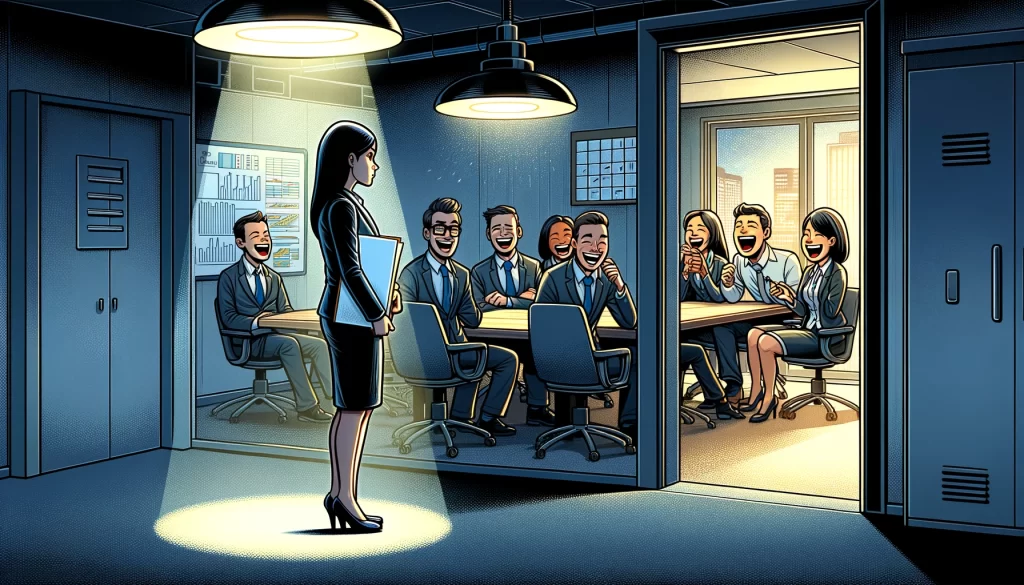Last Updated on March 3, 2024 by Daniel Boyce
Ever feel overlooked at work, no matter how hard you try?
You’re not alone.
We’re tackling the signs you are not valued at work, from missing out on well-deserved praise to being excluded from important decisions.
But it’s not just about noticing these issues; it’s about fixing them.
Ready to make a change?
Let’s explore some simple ways to ensure your contributions are recognized at work.

| Sign | Description |
|---|---|
| 1. Lack of Recognition and Appreciation | Your efforts, achievements, and contributions are consistently overlooked, impacting job satisfaction and respect in the workplace. |
| 2. Exclusion from Decision-Making Processes | Consistently being left out of important meetings or having your insights ignored signals a lack of respect for your expertise. |
| 3. Unequal Treatment and Favoritism | Select employees receiving special attention while others are sidelined undermines respect and fairness. |
| 4. Lack of Feedback and Communication | Without open lines of dialogue and feedback, it’s challenging to gauge performance and feel respected. |
| 5. Ignoring or Dismissing Your Ideas | Overlooking your contributions diminishes your sense of belonging and hinders professional growth. |
| 6. Overlooking Your Achievements | Failure to recognize your successes affects motivation, career progression, and sense of fulfillment. |
| 7. Inadequate Compensation and Benefits | Salary and perks not reflecting industry standards or contribution level signal a disregard for your efforts. |
| 8. High Turnover and Dissatisfied Colleagues | A high turnover rate and widespread dissatisfaction indicate systemic issues with recognition and respect. |
| 9. Increased Stress and Burnout | High demands without adequate support can lead to detrimental effects on mental health and job satisfaction. |
| 10. Feedback is Only Negative | Constant critique without acknowledging successes undermines professional confidence and growth. |
| 11. Disrespect and Belittlement | Dismissive comments or behaviors harm work-life balance and stunt career growth by eroding confidence. |
| 12. Constant Nitpicking | Persistent criticism of minor details clearly indicates you’re not valued, eroding confidence and satisfaction. |
| 13. Exclusion from Important Meetings | Missing out on critical discussions affects your professional growth and sense of belonging. |
| 14. Withholding Information | A lack of transparency can lead to confusion, hinder job performance, and negatively impact trust. |
| 15. Gossip and Negative Comparisons | Toxic behavior creates a hostile environment, affecting morale and diminishing respect among colleagues. |
| 16. Lack of Career Advancement | Opportunities for growth being bypassed reflects a disregard for your professional development and aspirations. |
Signs You Are Not Valued at Work
Feeling undervalued at work can be subtle yet deeply impactful. Let’s dive into the key signs that might indicate your contributions aren’t getting the recognition they deserve.
1. Lack of Recognition and Appreciation
When your efforts, achievements, and contributions are consistently overlooked, it signals a disconnect in acknowledging your value within the company.
This oversight can manifest as:
- Missing out on important meetings
- Receiving little to no positive feedback
- Your ideas being disregarded
Such signs not only impact your work-life balance and professional growth but also your overall job satisfaction and respect in the workplace.
81% of executives acknowledge that their organization does not prioritize employee recognition as a key strategic focus.
Addressing this gap is crucial for fostering a supportive environment where every employee feels valued and motivated.
2. Exclusion from Decision-Making Processes
When you’re consistently left out of important meetings or your insights are ignored in discussions that affect your job or the company’s direction, it signals a lack of respect for your expertise and contributions.
This sidelining can stifle professional growth, erode work-life balance, and diminish your sense of belonging and recognition in the workplace.
3. Unequal Treatment and Favoritism
When select employees consistently receive special attention, opportunities for growth, or recognition from bosses, while others are sidelined, it undermines respect and fairness.
This favoritism not only impacts morale but also professional development and work-life balance.
4. Lack of Feedback and Communication
Without open lines of dialogue, recognition for achievements, or constructive criticism, it’s challenging to gauge performance, hindering professional growth and work-life balance.
Effective communication fosters a respectful environment, ensuring every employee feels heard and appreciated.
Addressing this gap is essential for personal career advancement and cultivating a workplace culture where respect and recognition are paramount, empowering individuals to contribute their best.
5. Ignoring or Dismissing Your Ideas
When your contributions are overlooked, it not only diminishes your sense of belonging but also impacts your motivation and professional growth.
A valued employee’s insights and suggestions are considered essential for innovation and progress within the company.
Fostering an inclusive culture where every idea is valued ensures team members feel their contributions are essential to organizational success.

6. Overlooking Your Achievements
When your hard work and successes go unrecognized, it not only affects your motivation but also your career progression and sense of fulfillment.
Acknowledgment from bosses and colleagues is crucial for fostering a positive work environment, where respect and recognition are given freely, enhancing job satisfaction and encouraging professional growth.
7. Inadequate Compensation and Benefits
When your salary and perks don’t reflect the industry standard or your contribution level, it signals a disregard for your role and efforts.
Negative side effects of this are:
- Decreased employee motivation and engagement
- Higher turnover rates
- Reduced job satisfaction and morale
- Increased stress and financial insecurity among employees
- Difficulty in attracting and retaining top talent
Fair compensation is fundamental for recognizing employees’ work, fostering respect, and ensuring job satisfaction.
A survey encompassing 2,100 CFOs and 300 employees highlighted that the main reasons for employee departure are inadequate pay and benefits (28% of CFOs, 38% of employees), followed by limited advancement opportunities.
It’s vital for companies to offer competitive benefits and rewards to reflect appreciation, support professional growth, and maintain a positive work-life balance.
8. High Turnover and Dissatisfied Colleagues
When many are leaving or expressing discontent, it reflects broader issues with recognition, respect, and professional fulfillment within the company.
Such a scenario suggests a need for organizational changes to improve work-life balance, enhance job satisfaction, and foster a culture where every team member feels valued and motivated.
9. Increased Stress and Burnout
Constantly facing high demands without adequate support, recognition, or respect can lead to a detrimental impact on your mental health and job satisfaction.
Burnout stifles professional growth and work-life balance, making it crucial for companies to address these issues promptly.
Encouraging a culture that values each employee’s well-being and contributions is essential for fostering a positive workplace and ensuring long-term success and employee retention.

10. Feedback is Only Negative
This constant critique, without acknowledgment of successes or positive contributions, undermines professional confidence and growth.
It’s essential in a healthy work environment to balance constructive criticism with positive feedback, recognizing achievements and fostering a culture of respect and appreciation.
This balance is crucial for motivation, job satisfaction, and encouraging continuous improvement and innovation within the team.
11. Disrespect and Belittlement
Disrespect at work can manifest through dismissive comments, undermining your professional capabilities, or disregarding your contributions.
This environment not only harms your work-life balance but also stunts your career growth by eroding confidence and motivation.
Disrespect and belittlement at work can manifest in various ways, including:
- Public criticism or mocking of employees’ ideas or efforts.
- Dismissive behavior or ignoring contributions during meetings.
- Undermining an employee’s capabilities or qualifications in front of others.
- Using derogatory or demeaning language towards staff.
- Overlooking or undervaluing employees’ achievements and hard work.
A culture that actively combats disrespect and fosters recognition and positive feedback ensures everyone feels valued, promoting professional and organizational development.
12. Constant Nitpicking
Constant nitpicking at work, where every minor detail of your job is criticized, clearly indicates you’re not valued.
This persistent scrutiny can:
- Erode confidence
- Diminish work satisfaction
- Hinder professional growth.
It’s crucial for a positive work environment that employees feel their efforts are recognized and respected, rather than constantly belittled.
Encouraging constructive feedback and recognizing achievements can foster a culture of respect and appreciation, where every team member feels valued and motivated to contribute their best.
13. Exclusion from Important Meetings
Such exclusion means missing out on critical discussions, decisions, and opportunities to contribute your ideas, affecting your professional growth and sense of belonging.
This lack of inclusion can lead to a feeling of being undervalued and not respected by the company and its leaders.
It’s essential for a positive workplace culture that all employees are given equal opportunities to participate and have their voices heard, reinforcing their value to the team and the organization.
14. Withholding Information
Withholding information from employees is a clear sign of being undervalued at work.
This lack of transparency can lead to confusion, hinder job performance, and negatively impact trust within the team.
Essential for fostering a culture of respect and recognition, open communication ensures that all members are informed, valued, and able to contribute meaningfully.
15. Gossip and Negative Comparisons
This toxic behavior can create a hostile environment, affecting morale and diminishing respect among colleagues.
It’s crucial for a healthy work culture to promote positive feedback and constructive communication, ensuring each employee feels valued for their unique contributions.
Addressing and preventing gossip fosters a supportive atmosphere, essential for professional growth, work-life balance, and reinforcing the importance of every individual within the company.
16. Lack of Career Advancement
When opportunities for growth, such as promotions or involvement in pivotal projects, are consistently bypassed or unavailable, it reflects a disregard for your professional development and aspirations.
A supportive work environment should actively promote and recognize the potential in its workforce, offering clear pathways for advancement and personal growth.

This not only fosters a sense of being valued but also enhances job satisfaction and loyalty, contributing to a healthier, more productive workplace culture.
What to Do If You Are Not Valued at Work
Feeling stuck and unappreciated at work?
Here’s a quick roadmap to navigate through it:
- Self-Assessment: Reflect on your contributions and achievements.
- Open Communication: Talk to your supervisor or HR about how you’re feeling.
- Seek Professional Development: Look for opportunities to grow your skills.
- Evaluate Career Options: Consider if it’s time for a new job or career path
Remember, recognizing your worth is the first step towards change.
It’s about creating a plan that empowers you to seek out environments where you are valued and your career can flourish.
Taking these steps not only boosts your professional life but also your personal well-being.
Conclusion
Reflecting on the myriad signs of being undervalued at work, from lack of recognition to exclusion from crucial meetings, it’s clear the impact is profound on both professional growth and personal well-being.
Each point underscores the importance of a workplace that values its employees, fostering an environment where everyone feels appreciated and integral to success.
Remember, recognizing your worth is the first step towards finding a job that respects and values your contributions.

As you move forward, consider these insights not just as a reflection but as a guide to seeking out environments that will support and value your career aspirations.
Engage further by sharing your experiences and strategies for addressing workplace undervaluation, fostering a conversation that could enlighten others in similar situations.

Daniel Boyce, founder of AwareRecruiter.com, brings a diverse background in health, fitness, sales, and recruitment to career development. He’s passionate about helping professionals overcome workplace challenges and succeed in new roles. Daniel’s vision for AwareRecruiter.com is to create a comprehensive resource for career growth and satisfaction.